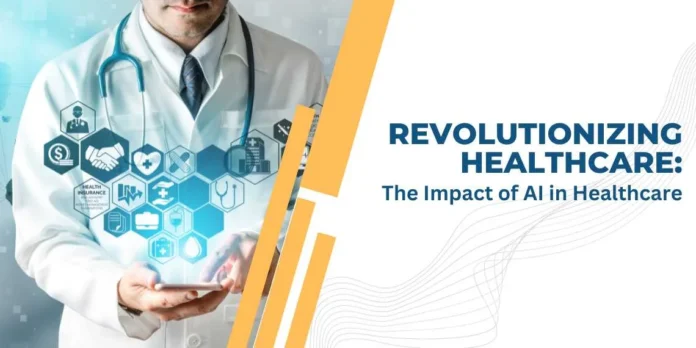Addressing challenges such as staff shortages, a growing population, restrained budgets, and increased administrative tasks, healthcare providers need help delivering essential care. Artificial intelligence (AI) advancements are now showing promising potential in medicine, balanced to transform the daily practices of doctors, nurses, and healthcare professionals, ultimately enhancing patient outcomes.
In the pharmaceutical domain, AI promises to expedite new drug development. This technology could assist physicians in preparing personalized care plans for individual patients within the doctor’s office. Furthermore, it can simplify medical researchers’ work by translating complex papers.

Experts foresee a significant transformation in the healthcare sector in the coming years, driven by AI. This transformation is expected to alleviate time constraints, enhance doctor-patient relationships, and contribute to the overall improvement of healthcare delivery.
Revolutionizing Drug Development
Traditional drug development, a lengthy and costly process, may witness a game-changing transformation with generative AI technologies, according to Sean McClain, CEO of Absci, a pioneer in AI-driven drug creation. McClain envisions leveraging high-quality training data to design safe and effective antibodies for challenging disease targets swiftly.
The concept involves inputting specific disease parameters into Absci’s AI platform, encouraging the generation of drugs or treatments with defined attributes such as potency, toxicity, and manufacturability. McClain believes this approach will significantly reduce patient costs and enhance the profitability of new drugs, shifting from traditional library screening to precisely designed medicines created on the computer.
Absci’s AI platform boasts the capability to test and validate nearly 3 million unique AI-generated designs weekly, with results from the wet lab informing continuous improvements to the AI model in an iterative cycle.
Personalized Healthcare
Beyond drug development, AI technology is pivotal in enabling medical practitioners to prepare personalized care plans for patients with conditions like prostate cancer. Tim Showalter, Chief Medical Officer at ArteraAI, a precision-medicine company, highlights the limitations of existing guidelines for treating prostate cancer, emphasizing the need for personalized care outcomes.
The ArteraAI Prostate Test, an AI-powered tool that helps physicians predict their patients’ reactions to particular medicines, fills this vacuum. The test helps physicians make customized treatment decisions by providing a projection score based on biopsy pictures and clinical data analysis. Showalter emphasizes the test’s specificity to individual patients and quick turnaround time.

Collaborating with institutions like Northwestern Medicine, the Fred Hutchinson Cancer Center, UW Medicine, and the University of California San Diego, ArteraAI has successfully applied its technology to generate results for prostate cancer patients, showcasing the potential of AI in revolutionizing both drug development and personalized healthcare.
Improving Medicine Research
Staying up-to-date with the latest medical research is crucial for developing treatments for new diseases. However, this task has become challenging and time-consuming with the vast number of medical research papers available.
In genomic medicine, where healthcare delivery is personalized based on an individual’s genomic information, the complexity is amplified due to the extensive number of human genes, many yet to be studied in cancer research.
Japanese tech giant Fujitsu aims to address this challenge by introducing an innovative AI tool. This tool is designed to help doctors efficiently study the entire human genome to advance cancer treatment.

Fujitsu’s tool assists doctors in extracting relevant data from research papers on specific genomic topics. This information can then be used to create personalized cancer treatment plans swiftly. The company claims its solution has cut the time required for medical professionals to review genome-variation research by more than half.
In collaboration with the Aichi Cancer Center in Nagoya, Japan, Fujitsu’s tool has analyzed over 1.2 million medical research papers in clinical trials involving 450 cancer patients. Fujitsu envisions the system aiding clinicians in identifying drug candidates effective against specific gene mutations, contributing to advancements in cancer treatment.
Considerations for AI in Healthcare
Healthcare practitioners using AI must manage several risks in addition to the technology’s potential benefits.
Tim Showalter says a significant challenge is the potential bias in AI technology. He emphasizes the need for clinicians to mitigate bias by ensuring diverse datasets are used in AI training. Consistent questioning and scrutiny of datasets are vital in this process.
Showalter also highlights the risk stemming from a lack of comprehensive regulations in healthcare AI. Although the US government is taking steps to address this through executive orders, all stakeholders, including medical professionals, researchers, technologists, and lawmakers, must collaborate to ensure strict clinical validation of medical AI. This commitment not only meets regulatory standards but also upholds the highest standards of patient care.
Surya Josyula, Director of Marketing at Fujitsu Laboratories of America, cautions against excessive reliance on AI technologies in healthcare. He emphasizes the importance of involving physicians or care providers to ensure the AI engine makes accurate diagnoses.
Sean McClain raises concerns about China’s fast-emerging role in AI, posing a potential threat as its technology gains wider adoption. He notes the need for robust data safeguards in the Chinese government. McClain also warns of the risk of bad actors using AI to create biological threats, emphasizing the need for the United States and other nations to support innovators in developing AI-based countermeasures.
Maximizing the Benefits of Healthcare AI
For healthcare organizations and practitioners new to utilizing technologies like AI, experts suggest a few straightforward steps to ensure the effective implementation of AI-driven treatments and improve patient outcomes.
Tim Showalter advises medical practitioners to approach AI with “suspicion and exposure.” This balanced perspective facilitates a thorough evaluation of innovations, fostering advancements that genuinely enhance patient care.
Sean McClain recommends adopting a “build-versus-buy” strategy for AI, particularly if organizations plan to make AI a focal point of their strategic visions. Developing in-house AI systems ensures the retention of essential knowledge and skills within the organization. However, he acknowledges that outsourcing may be more suitable for organizations that view AI as less strategically important.
Surya Josyula predicts that the rise of AI will significantly reshape the healthcare landscape, emphasizing a future where healthcare is increasingly “driven by data” and characterized by high personalization. He underscores the importance of the medical industry grasping the “fundamentals of AI and its applications in healthcare” to guide and harness AI’s transformative potential in healthcare effectively.





